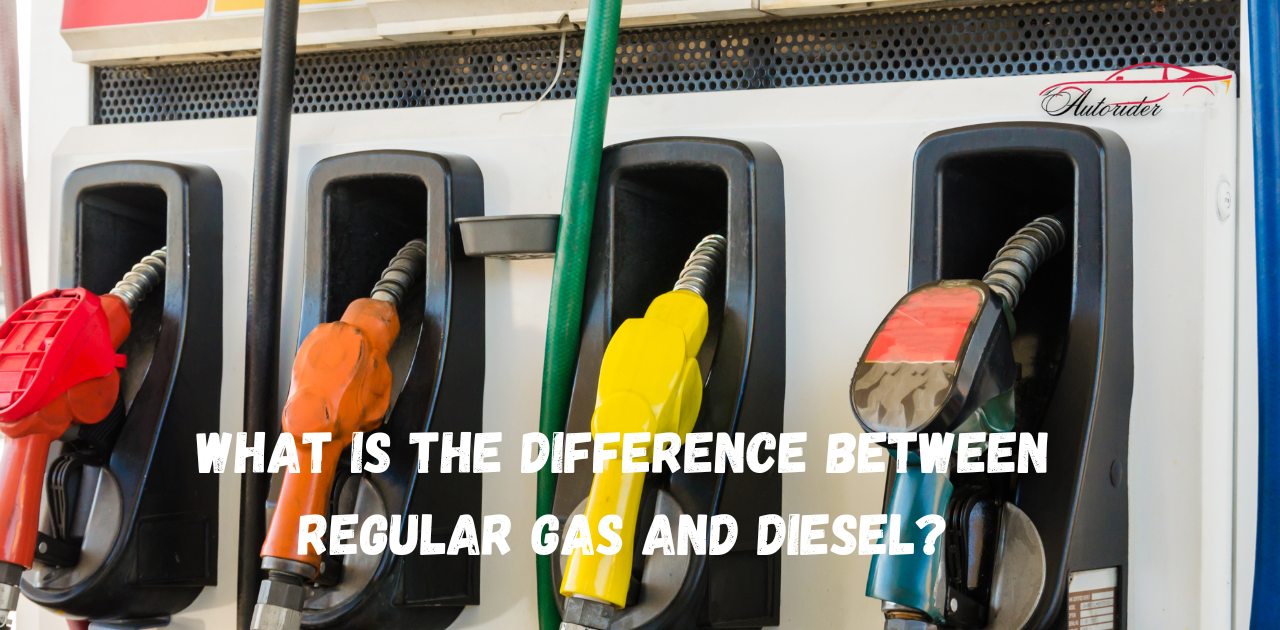What Is the Difference Between Regular Gas and Diesel? As a driver, you have probably noticed that there are different types of fuel available at gas stations. The most common types of fuel are regular gasoline and diesel. But have you ever wondered what the actual difference is between these two fuels? In this article, we will explore the characteristics, composition, and usage of regular gas and diesel, helping you understand their distinctions and make informed choices at the pump.
Composition and Characteristics
The primary difference between regular gas and diesel lies in their composition and how they combust inside an engine.
Regular Gasoline: Regular gasoline, also known as unleaded gasoline, is a petroleum-based fuel commonly used in most gasoline-powered engines. It is predominantly composed of hydrocarbons, molecules made up of hydrogen and carbon atoms. Gasoline also contains various additives, such as detergents and corrosion inhibitors, that help enhance engine performance and protect vital components.

Diesel: Diesel, on the other hand, is a heavier and denser fuel compared to regular gasoline. Like gasoline, it is derived from crude oil; however, the refining process results in a higher energy content and different chemical composition. Diesel fuel is primarily made up of longer hydrocarbon chains, which give diesel its higher energy density.
Combustion Process
The combustion process is where the main distinction between regular gas and diesel becomes evident:
Regular Gasoline: Gasoline engines utilize a spark ignition system, where a spark plug ignites an air-fuel mixture inside the engine cylinder. Gasoline, being highly volatile, vaporizes and mixes easily with air. The spark from the spark plug initiates the combustion process, resulting in an explosion that drives the engine’s pistons.
Diesel: In contrast, diesel engines use a compression ignition system. The air inside the cylinder is compressed to a high pressure, significantly increasing the temperature. Then, diesel fuel is injected directly into the combustion chamber, where it ignites due to the heat generated by the compressed air. The absence of a spark plug means that diesel engines rely solely on the heat produced by compression to ignite the fuel.
Performance and Efficiency
The differences in combustion mechanisms lead to various performance and efficiency characteristics:
Power and Torque: Due to the higher energy density of diesel fuel, diesel engines tend to produce more torque, making them well-suited for heavy-duty applications such as towing and hauling. Gasoline engines, on the other hand, generally have higher RPM limits and can deliver more horsepower, providing better acceleration and top-speed capabilities.
Fuel Economy: Diesel engines are known for their superior fuel efficiency compared to gasoline engines. This is primarily due to the higher energy content of diesel fuel and the more efficient combustion process. Diesel vehicles typically offer higher mileage per gallon, making them a popular choice for long-distance travel and commercial applications.
Emissions: Modern gasoline and diesel engines are equipped with emission control systems to minimize their impact on the environment. However, diesel engines historically emitted higher levels of nitrogen oxides (NOx) and particulate matter, contributing to air pollution concerns. Stringent emission regulations have led to the development of cleaner diesel technologies, but gasoline engines still generally have an advantage in this area.
Practical Considerations
When choosing between regular gas and diesel, several factors beyond the fuel itself should be considered:
Vehicle Type: Diesel engines are commonly found in trucks, commercial vehicles, and some fuel-efficient passenger cars. Gasoline engines are dominant in smaller cars and most consumer vehicles. Vehicle manufacturers often determine the fuel choice based on factors like engine design, performance goals, and market demand.
Availability and Infrastructure: Gasoline is more widely available than diesel fuel, with gas stations offering regular gasoline almost everywhere. However, refueling options for diesel vehicles can be limited, especially in remote areas. Diesel engines require specialized maintenance and diesel-specific fuel filters, which may incur additional costs.
Fuel Price: Fuel prices vary geographically and fluctuate based on market conditions. Generally, diesel fuel is known to be more expensive than regular gasoline. However, the higher efficiency of diesel engines can often offset the price difference by providing better mileage per gallon.
In conclusion, the main differences between regular gas and diesel lie in their composition, combustion process, performance characteristics, and practical considerations. By understanding these distinctions, you can make informed decisions when purchasing a vehicle or fueling up at the pump, considering factors such as the vehicle’s intended purpose, fuel availability, and overall efficiency.
FAQs: What Is the Difference Between Regular Gas and Diesel?
Q: Can I put regular gas in a diesel engine or vice versa?
A: No, you should never put regular gasoline in a diesel engine or diesel fuel in a gasoline engine. Diesel engines require specialized fuel injection systems and combust the fuel differently than gasoline engines. Putting the wrong fuel in your engine can cause severe damage and can be dangerous.
Q: Which one is better for the environment, regular gas, or diesel?
A: Both regular gasoline and diesel have an impact on the environment, but diesel historically emitted higher levels of nitrogen oxides (NOx) and particulate matter. However, the newer diesel engine technologies have greatly reduced emissions to meet stringent regulations. Gasoline engines also have to comply with emission regulations, but diesel engines still have a slight disadvantage in this area.
Q: Which one is more fuel-efficient, regular gas, or diesel?
A: Diesel engines are generally more fuel-efficient than gasoline engines because diesel fuel has a higher energy density and the compression ignition combustion process is more efficient. Diesel vehicles typically offer higher mileage per gallon, especially in highway driving conditions. However, gasoline engines have improved their fuel efficiency in recent years, and hybrid and electric engines are becoming more popular alternatives for greater fuel efficiency.
Q: Why are diesel engines used more in commercial vehicles and trucks?
A: Diesel engines produce high torque and can handle heavy loads, which makes them suitable for larger and heavier vehicles like trucks and commercial vehicles. Additionally, diesel fuel is more energy-dense than gasoline, and diesel engines are more fuel-efficient, which helps to reduce fuel costs over time.
Q: Is diesel fuel more expensive than regular gas?
A: Generally, diesel fuel is more expensive than regular gasoline. However, the higher energy content of diesel fuel and the more efficient combustion process can offset the price difference by providing better mileage per gallon. Fuel prices vary geographically and fluctuate based on market conditions, so it is best to check the current prices before making a decision.
Q: What should I consider when choosing between regular gas and diesel?
A: Several factors should be considered when choosing between regular gasoline and diesel fuel, including the intended use of the vehicle, fuel availability, infrastructure, and fuel price. Also, consider factors such as performance, efficiency, emissions, and the overall maintenance costs of the engine. Make an informed decision that meets your specific needs and budget.

